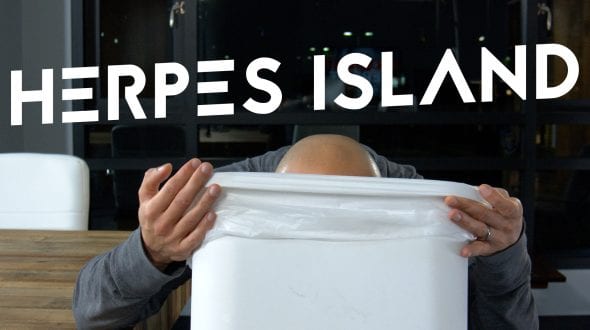Here’s what we know about the effects of coronavirus on smell and taste.
Here’s the Nature review on this, and it has references to the other studies mentioned.
Full Transcript Below.
Hey guys. What’s going on with this loss of sense of smell in COVID? A lot of patients from the beginning have reported that they lose their sense of smell, sometimes their sense of taste, sometimes their ability to detect spicy food, which is called chemesthesis, and all those have slightly different mechanisms, and I think what I want to do today is review the understanding so far on the science of this, because every day we learn something new about this virus and by understanding it, we get a better sense of how the virus works, and also what it means if you lose your sense of smell because so many people are getting infected and so many people are having this symptom. So this is how we think it works, and I’m going to summarize a review article in Nature that I’m going to link to in the show notes.
All right, so it turns out from early on in this pandemic, people were reporting that a sense of sudden loss of smell was really common in patients who ultimately showed themselves to be infected with the SARS-CoV-2 virus, and it’s sudden, so it’s not like, you know, you slowly start to notice your sense of smell is changing. It’s like, all of a sudden, patients will say, “I just couldn’t smell,” and some patients were not just reporting total smell loss, they were saying, oh, there’s some problem with smell or things that smelled good to me now smell all equally rancid, and that’s actually called parosmia, when things smell wrong to you.
Anosmia is the complete lack of smell, and so there was a spectrum of this stuff and people were reporting that their sense of taste was gone, which is a different mechanism and their ability to taste spicy food, which is even different than taste. So taste is these sensory receptors, sorry, the sort of sensory nerves on the tongue that are responsible for your sense of taste, but chemesthesis, detecting like say, spicy food or chemical irritation, is a different set of nerves, and all of them have been reported in different degrees to be affected in COVID infection. Now, we couldn’t figure out what was going on because there are a lot of viruses that’ll cause a loss of smell and taste too, and the thought with those is that sometimes they can actually cause the death off olfactory neurons.
So the way smell works is there’s this lining in the nose. There’s two types of lining in the nose, the sort of respiratory epithelium that makes the snot and the boogers and is contiguous and very similar to what happens in the rest of the respiratory tract, in the, all the way down the airways into the lung. It’s that type of tissue, right, but then there’s the olfactory epithelium, olfactory meaning sense of smell, and that contains the olfactory nerves, in other words, the nerves that carry the signal of smell to the olfactory bulb in the brain, and from then on it’s processed into what we experience consciously as smell. So that olfactory epithelium contains the nerves, but it also contains these support cells called sustentacular cells. They’re little cells that actually help with the salt balance around the nerve cells, help with nerve cell protection and regeneration, and just basically they’re like helper cells for the nerves but they’re not nerves themselves.
So it turns out, a lot of viruses might actually damage olfactory nerves themselves, and therefore it takes a long time to recover that sense of smell because nerves take a long time to regenerate. In SARS-CoV-2 though, they actually, there were studies that are linked in the show notes that actually looked at this and what they found was the nerves themselves didn’t seem to be infected. It was those sustentacular cells, the helper cells that were infected, and the reason likely that they were is that they express high levels of the ACE2 receptor. So to remind you guys, the ACE2 receptor is the way that the virus binds, it’s our, it’s like our door key, not the key, the lock really. Let’s just call it that, and the virus has the key in the form of its spike protein. So it uses its key to unlock its way into the cell, using ACE2 receptors as a sort of keyhole.
It turns out these sustentacular cells have those receptors in abundance, at least in mice that have been looked at. So it makes sense that this virus enters through the nasal passages and through the airways, replicates there in the respiratory epithelium next door, and then it’s an easy extrapolation to see them actually infecting those sustentacular cells, and that’s what these researchers showed was that these cells express proteins that were made by the virus that showed viral entry had occurred. So could it be that you’re knocking off the helper cells, it’s causing a problem with the actual olfactory nerve itself and that’s what’s responsible for the smell loss? Well, it’s entirely possible because for many people, 70% roughly in some studies, the sense of smell comes back at least partially within a month, which is pretty fast.
That’s faster than typical nerve regeneration, right? So, you know, some viruses, it takes months to get your sense of smell back. So it could be that that’s it, but there was another interesting piece because about a year later now, since the earliest coronavirus infections that we have documented anyways, some people still don’t have their sense of smell back. Anosmia, the loss of smell, they still don’t have or they’re still having parosmia where things are smelling bad, like, you know, off, rancid, not quite right. They can’t identify odors, and so what, what could be, what else could be going on? Well, there was another study that looked at the olfactory bulb itself.
So that’s the part of the brain actually where all the signal is heading and what they found is there were clear signs of inflammation, leaky blood vessels, and inflammation, et cetera, and the theory might be, and this was in patients who had died of coronavirus, So they, these were autopsy studies, right? And so, so it may be that they were sicker too, but what they saw was enough that would say, “ooh, this is actually some more central damage.” Now what they didn’t necessarily see was virus in that location. So they didn’t see virus infecting the olfactory bulb. That’s very rare, but what they did see was all this inflammatory effect. So you have this overwhelming inflammation in response to the virus and then damage to individual organs, and in this case, olfactory bulb showed damage.
So could it be that some people get this inflammatory syndrome that knocks their sense of smell out for much longer? It’s possible. Some people may be enough of a sense, sustentacular cells, the helper cells die so that, and I’m speculating here, so that the individual neurons actually start taking a hit and they die, and it takes much longer to regenerate those. So we need to study it more, and the question is, but why, why even bother? Oh, you lost your sense of smell, who cares? All right, well, you don’t seem to care much about it. You don’t care, it’s not like blindness or deafness or something like that. You don’t care much about it until you actually lose your sense of smell and this is why it matters, okay? Whether if, let’s say you’re a chef, well then it matters a lot. Let’s say you’re a wine connoisseur.
Well, your whole enjoyment of wine is, is, is lessened, but for many people a sense that, for most people a sense of smell is a way to detect food that’s gone bad. It’s a way to detect the smell of burning stuff, so detecting fires, detecting gas leaks, bonding with your child through that new baby smell. Our sense of smell, there’s a pheromonal component. So there’s a lot more to human well-being and survival actually, and thriving that has to do with the sense of smell. They did a study on people who have anosmia, the congenital inability to smell or acquired inability to smell, and what they found was they’re twice as likely to suffer some harmful event, whether it’s, you know, a fire or whether it’s food poisoning, then someone who has an intact sense of smell and this just makes sense. The other problem is people’s lives can be really upset when you have parosmia and everything smells, things that smell good are now smelling bad. So what are the options for them? Well, you can retrain a sense of smell.
There’s a thing called smell training where you can actually, you have known smells and you can reteach and relearn. Maybe these cells regenerate over time that’s longer and it starts to come back. So it’s like physical therapy for the nose. It doesn’t work for everyone. It was studied pre-pandemic, and it may be that this is something we need to look at it a little more. It’s also another reason you don’t even, so this is the fascinating piece. The sense of smell loss is clearly not due to mucus, and all that other stuff, ’cause I know there’s people thinking, “well, it’s just ’cause you’re snotty “because you’re infected with a coronavirus.” So a lot, for a lot of people that were studied, sense of loss of smell was the only symptom they had. So they didn’t even have other symptoms.
They were largely asymptomatic but they reported a loss of smell, which is why some authorities have said losing your sense of smell is one of the best screens we have for coronavirus infection that may be otherwise asymptomatic because it happens in, you know, 40%, 50% of patients, maybe more if you really look for it and it’s more reliable than, you know, fever and these other things that don’t happen as often. So it’s kind of interesting. So getting people rehab from a smell standpoint and then wondering what the heck’s going on with taste. Totally different system and chemesthesis, totally different system. We still don’t have a clue. Now what’s interesting is for taste, that often gets better and even a higher percentage of people much within a month. According to studies out of Iran, it seems to happen faster.
So at least there’s that. Now remember this loss of sense of taste is related also to smell. Smell, taste, and sensation in the tongue all combine to create what we think is flavor, but you can actually isolate them and that’s what they did. So it’s not because you lost your sense of smell that your sense of taste went away because that’s a valid question to ask. These are separate functions that they’re looking at in these studies. Now one last interesting twist on this. We talked about the olfactory epithelium. the olfactory epithelium has been implicated, the damage thereof has been implicated in something that you may have heard of, which is, remember those zinc nasal sprays and nasal gels that were marketed to lessen the severity of a cold or prevent colds when you’re first having symptoms, et cetera, and what they found, FDA actually had to put a warning out because people were losing their sense of smell from some of those products, and what most of them reported is they would use, they would inhale very deeply with the, with the sprayer and they would report then a burning like a, you know, profound burning that would sometimes last for a long time followed by loss of smell, and for some of those patients the loss of smell never recovered.
So the thought is that that high-dose zinc cation or something else in the formulation they were using actually burned and damaged that olfactory epithelium severely enough that they lost their sense of smell. So it’s interesting to think about smell. We don’t often think about it and yet it can be quite important. So with the SARS-CoV-2 virus, we keep learning. We keep learning how this thing works. Yet another reason try to stay safe, to get vaccinated, to just prevent yourself from suffering these side effects, because again, for the small percentage of people who remain anosmic, that’s a life-changing event. We don’t know if it’s going to recover because it’s only been a year. All right guys, hope this was helpful. If you like the show, become a supporter especially on Locals, which is off the Facebook-YouTube grid and is just a really cool community. Links are at zdoggmd.com/supporters. Share this video, leave a comment. That helps a lot. I love you guys and we are out. Peace.
Category
- The ZDoggMD Show (817)
- Featured Videos (189)
- Doc Vader (142)
- Against Medical Advice (128)
- Medical Humor (95)
- Public Service Announcements (87)
- Music Parodies (74)
- Nurses (59)
- Meditation (45)
- The VPZD Show (38)
- ZVlogg (36)
- ZTalks (28)
- ZBlogg (24)








